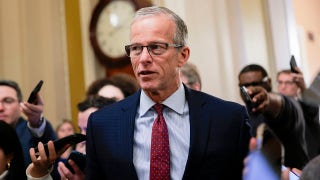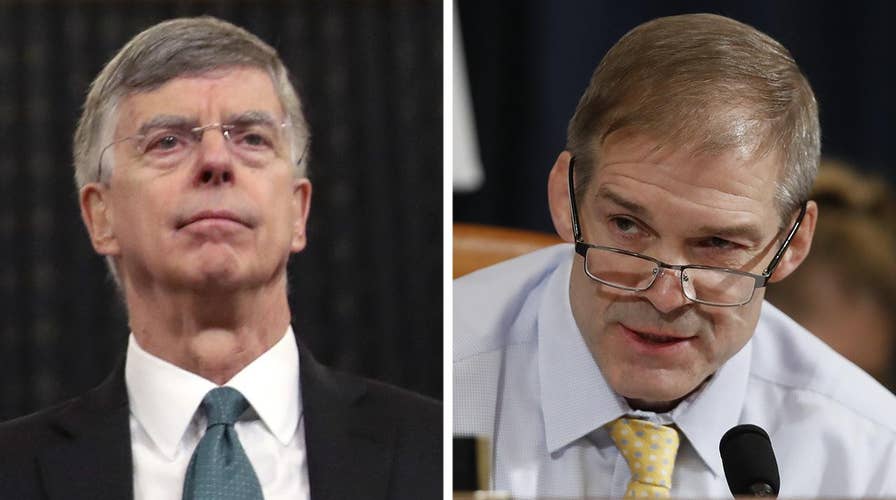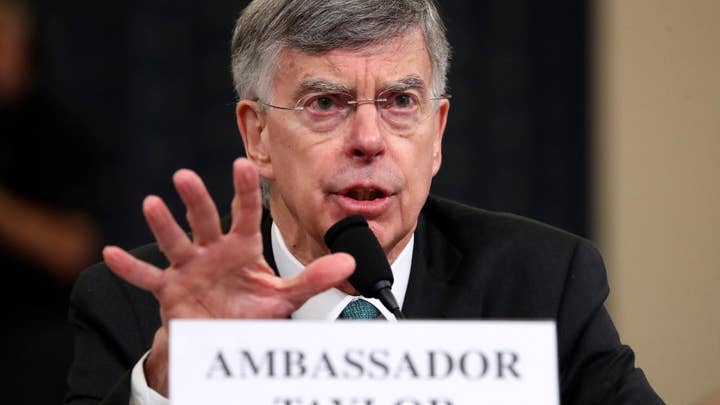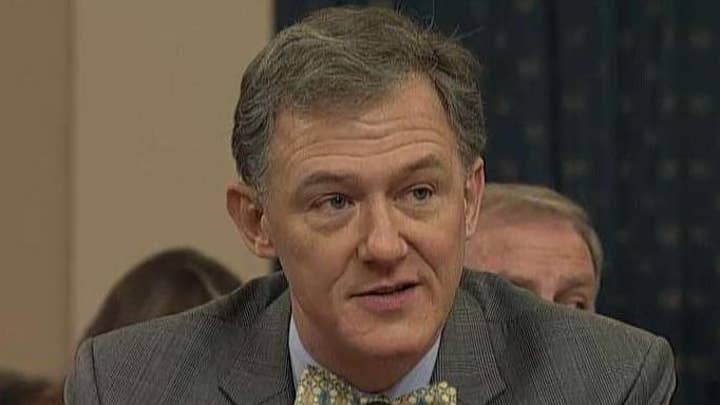Rep. Jim Jordan questions Amb. William Taylor during impeachment hearing
Ohio Congressman Jim Jordan, Republican member of the House Intelligence Committee, presses Acting U.S. Ambassador to Ukraine William Taylor over how he formed his 'clear understanding' of linkage between U.S. aid to Ukraine and an investigation of the Bidens.
Diplomats testifying on the opening day of impeachment inquiry hearings delivered a stark account Wednesday of President Trump's pursuit of political "investigations" in Ukraine and attorney Rudy Giuliani's alleged meddling in that country, while Republicans panned the entire process as a "low-rent Ukrainian sequel" to the Russia collusion case and hit back at the claims as mere “hearsay.”
For his part, Trump spent much of the day meeting with the visiting Turkish president, saying he was too busy to watch the historic hearing. And he released a video declaring: "They're trying to stop me because I'm fighting for you. And I'll never let that happen."
Fireworks sparked from the very opening of the hearing, as GOP Rep. Devin Nunes accused Democrats of running a "scorched earth war" against the president. Republicans also ripped into Intelligence Committee Chairman Adam Schiff, D-Calif., after the Democrat interrupted GOP questioning to say a witness should be "cautious" about answering questions that assume facts not in evidence before him.
But in between the sparring among lawmakers was extensive testimony from the two lead-off witnesses, State Department official George Kent and top U.S. diplomat in Ukraine Bill Taylor.
THE IMPEACHMENT HEARING WITNESSES: WHO IS BILL TAYLOR?
Notably, Taylor testified, for the first time, that the president was overheard by a member of his staff on July 26 asking EU Ambassador Gordon Sondland about “the investigations,” to which Sondland responded that “the Ukrainians were ready to move forward.”
Taylor said that following Sondland’s call with Trump, the member of his staff asked what Trump thought about Ukraine.
“Ambassador Sondland responded that President Trump cares more about the investigations of Biden, which Giuliani was pressing for,” Taylor said, revealing new information from his prior testimony last month. “At the time I gave my deposition on October 22, I was not aware of this information. I am including it for completeness.”
This conversation would have taken place a day after the now-famous phone call Trump had with Ukrainian President Volodymyr Zelensky, in which he sought a probe into alleged Ukraine interference in the 2016 election and of Joe Biden's role in ousting a prosecutor who had been looking into Burisma, where son Hunter Biden had a lucrative role on the board. Taylor made clear it was his understanding the term "investigations" indeed referred to the Biden family and Burisma. Trump is accused of not only pressing Kiev to look into those issues, but potentially linking that request to U.S. military aid for Ukraine, something Trump denies.
Taylor's testimony would offer another account linking Trump to the pursuit of those probes, and to Giuliani's controversial involvement abroad. Taylor also repeated his prior closed-door testimony that he understood critical U.S. aid was being held up, along with a Zelensky White House meeting, over the investigation issue. However, the newly revealed phone call did not by itself address any quid pro quo.
THE IMPEACHMENT HEARING WITNESSES: WHO IS GEORGE KENT?
"The security assistance—not just the White House meeting—was conditioned on the investigations," he said he was told.
Republicans sought to undercut the Democratic case by saying the Ukraine aid was ultimately released without any of the investigations sought by Trump, arguing that shows no quid pro quo took place.
Ohio GOP Rep. Jim Jordan referenced three separate meetings Ukraine’s president held with U.S. officials, saying there’s no evidence participants discussed the “linkage” of security assistance dollars in return for an investigation of the Bidens. Taylor confirmed that’s the case.
Jordan also got Taylor to acknowledge he’s never met Trump and stressed that Zelensky did not announce the investigations, saying, “Your clear understanding was obviously wrong, because it didn’t happen.”
Republicans were quick to point out that Taylor was not providing first-hand information. At one point, Taylor said, “I don’t know what President or candidate Trump was thinking about the Ukrainians.”
During one combative exchange, Texas Rep. John Ratcliffe asked the diplomats if they believe Trump committed an impeachable offense. Neither would say. “That’s not what either of us are here to do," Taylor said. "This is your job.”
The White House further argued that Taylor offered "hearsay of hearsay" and accused House Democrats of basing "this entire sham on what amounts to a game of telephone."
Republicans also lamented that Democrats aren’t allowing the anonymous whistleblower who filed the complaint that ignited the inquiry to testify, with Jordan saying they should have "the person who started it." A Democrat on the committee, Vermont Rep. Peter Welch, shot back: "I'd like to see the person who started it come testify: President Trump."
Rep. Eric Swalwell, D-Calif., also asked both men if they are "Never Trumpers" as Trump has claimed. Both men denied it.
Meanwhile, during Kent’s testimony, he clarified that while he had raised concerns of a conflict of interest over Hunter Biden’s role on the board of Ukrainian natural gas firm Burisma Holdings during February 2015, he did not see any effort from U.S. officials to protect that firm from criticism or investigation.
“My concern was that there was the possibility of a perception of a conflict of interest,” Kent said during questioning from Republicans. Kent also said he would like to see Ukraine investigate other accusations involving a corrupt prosecutor and Burisma.
Both officials voiced concerns about the involvement of Giuliani. Kent alleged he was trying to "gin up politically motivated investigations." Taylor said Giuliani and others were involved in a "highly irregular" diplomatic channel in Ukraine that eventually diverged with the more formal channel.
Meanwhile, Schiff outlined the parameters of the impeachment inquiry, questioning whether the president sought to condition official acts and “exploit” Ukraine’s “vulnerability” for personal political gain.
“The matter is as simple and as terrible as that,” Schiff said Wednesday. “Our answer to these questions will affect not only the future of this presidency but the future of the presidency itself, and what kind of conduct or misconduct the American people may come to expect from their commander in chief.”
Schiff described the core of the impeachment inquiry, and said: “If this is not impeachable conduct, what is?”
But committee Ranking Member Devin Nunes, R-Calif., staunchly defended the president and his actions, blasting Democrats for their “scorched earth war against President Trump” and calling the impeachment inquiry a “carefully orchestrated media smear campaign.”
Prior to Schiff swearing in the witnesses, Republicans including Rep. Elise Stefanik, R-N.Y., and Jordan challenged Schiff to schedule a hearing with the anonymous whistleblower whose complaint sparked the impeachment inquiry. They also accused Schiff of being the only member of the House, along with his staff, to know the identity of the whistleblower.
Schiff fired back, saying that he does not know the identity of that individual -- though his staff has had contact with the whistleblower.
White House Press Secretary Stephanie Grisham, meanwhile, blasted the hearing as a "sham" and "colossal waste of taxpayer time & money."
For the Democrats, Daniel Goldman and Daniel Noble, both counsels for the Intelligence Committee, were tapped to handle portions of questioning. On the Republican side, Steve Castor, whom Jordan brought over from the Oversight Committee, will be the counsel to pose questions for the minority.
At the center of the impeachment inquiry, which began in September, is Trump’s July 25 phone call with Zelensky. That phone call prompted a whistleblower complaint to the intelligence community inspector general, and in turn, the impeachment inquiry in the House.
The president’s request came after millions in U.S. military aid to Ukraine had been frozen, which Democrats and some witnesses have cited as a quid pro quo arrangement.
CLICK HERE TO GET THE FOX NEWS APP
Zelensky, though, has said he felt no pressure during the call. The White House has maintained no wrongdoing, with the president calling the call “perfect” and arguing that it contained “no quid pro quo.”
The whistleblower’s complaint also stated their concerns that Trump was soliciting a foreign power to influence the 2020 presidential election – a concern that Taylor directly testified to privately last month.
Taylor, during his closed-door deposition, testified that he “understood that the reason for investigating Burisma was to cast Vice President Biden in a bad light.” Taylor added that it would benefit “a political campaign for the reelection of President Trump.”
Meanwhile, Schiff has already teed up three days of additional public hearings next week which, among other witnesses, includes three sought by Republicans—ex-National Security Council official Tim Morrison, former Ukraine envoy Kurt Volker, and high-ranking State Department official David Hale.
Republican lawmakers have sought a slew of other witnesses, including Hunter Biden and the whistleblower, but it is not yet clear whether any will be permitted to testify by Democrats on the committee as part of the inquiry.














































